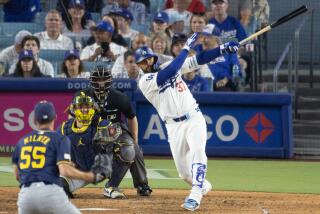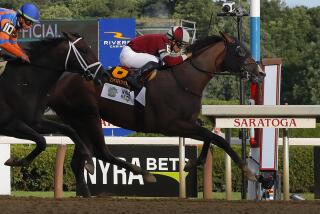A Sneaking Sensation
LOUISVILLE, Ky. — In 1975, trainer LeRoy Jolley won the Kentucky Derby with Foolish Pleasure and was denied, for a time, entrance to the winner’s circle.
Seventy years ago, security at the Derby wasn’t as tight as Jolley found it to be.
Frank Stroner went to the 1931 Derby, sneaking under a fence to get into Churchill Downs, then shinned up a water pipe to the grandstand roof, from where he watched, as a wide-eyed 20-year-old, while Twenty Grand won in record time.
Stroner, who will turn 90 Friday, the day before the 127th Derby is run, has come forward with all the puckish details. He is entitled to the assumption that the statute of limitations preempts prosecution of those youthful transgressions.
Living in the Chicago suburb of Fox River Grove with Helen, his wife of almost 65 years, Stroner still visits most of the local tracks, using an arcane betting system, but he has never been back to the Derby. The rollicking weekend that he and two neighborhood chums spent in Louisville at the height of the Great Depression was enough. His memories are indelible.
They left for Louisville from Chicago’s West Side, Jerry Shotala driving, Stroner and Clem Hegner riding beside him in the front seat of Shotala’s 1929 Ford roadster. There was no back seat, only a rumble seat in the rear.
The weather was warm, and before long on the 300-mile journey, they had cranked open the windshield at the bottom, the best you could do long before the days of air-conditioning.
“We’d rather have the bugs than the heat,” Stroner said. “But there were a lot of bugs. We put up with the stinging.”
Driving almost straight through, they arrived in Louisville on Derby eve. Shotala stopped at a gas station not far from Churchill Downs to fill up. Louisville hoteliers had not yet hit upon widespread gouging of Derby visitors, but these lads were not exactly flush and had no intention of paying for a hotel, anyway. The owner of the gas station had plenty of room in back, he said, and invited them to park their car there overnight.
Shotala and Hegner slept in the front seat, Stroner in the cramped rumble seat. He had $5 or $6 in his pocket, but they had read about Twenty Grand, the Derby favorite, and hoped to bet on him the next day.
Early on Derby day, they walked to the track and were shocked to find that admission was $3--apiece. That would put a sizable dent in their betting money.
Circling the grounds, they came to Longfield Avenue, the thoroughfare outside the barn area. Between the sidewalks and the barns was a high chain-link fence, with barbed wire on top. All along the fence, however, someone had dug holes, 50 or 60 of them, wide and deep.
Thousands of people had gathered outside the fence, as many as 100 to one of the holes, and a man--they called him “the captain”--appeared to be supervising the operation.
“Give me a nickel, and I’ll let you crawl through,” he said.
Stroner and his friends paid their nickels. Still lots left for the Twenty Grand bet.
On a high ladder outside the fence, working with “the captain” was a man Stroner called “the general.”
Every few minutes, “the general” yelled out numbers of holes.
“OK,” he said. “Holes 6, 10, 15 and 30--everybody go through.”
Waiting on the other side of the fence were dozens--maybe hundreds--of men, many of them on horseback.
“They looked like deputies to me,” Stroner said. “Maybe not police, but men deputized by the racetrack to keep order.”
Armed with clubs, they rounded up as many of the gate crashers as possible, shunting them into holding pens. But . . .
“There were many more of us than there were of them,” Stroner said. “The three of us, along with hundreds of others, were able to swarm across the grounds, eluding the deputies.”
Clear of authority, Stroner and friends realized that they still weren’t close to where they wanted to be. The stands were on the other side of the racetrack.
“Somebody came up to us,” Stroner said. “He looked like a groom or a stablehand. He said that if we each gave him 10 cents, he had passes that would get us in. But he said we had to give back the passes after we got in. He was going to sell them as many times as he could.”
Even so, the young men from Chicago discovered that they couldn’t see much of the horses.
“We were determined to find a place where we could watch the Derby,” Stroner said. “We found this pipe that led up to the roof . . . and climbed up. It might have been a few stories all the way up there, but we made it.”
On the roof were radio broadcasters, overflow newspapermen, track officials. In fact, this was the first Derby that was carried by the BBC to listeners in England, who stayed up until midnight to hear the call.
“Nobody bothered us,” Stroner said. “We had the best seats in the house.”
The three of them had pooled their money to buy a $2 win ticket on Twenty Grand, who was part of a three-horse entry owned by Helen Hay Whitney’s Greentree Stable.
Twenty Grand was only one in a stellar group of 3-year-olds. Then, the Preakness was run before the Derby, and at Pimlico, only a week before, favored Twenty Grand and his jockey, the renowned Charlie Kurtsinger, deserved to win, but their path was trouble-strewn and they finished second, 1 1/2 lengths behind the estimable Mate.
Before a crowd of about 40,000, smallish because of the Depression, Twenty Grand won the Derby by four lengths, with Mate finishing third.
Stroner and his companions rushed to a mutuel window to cash their Derby ticket, collecting $3.76, a profit of $1.76. Leaving the track, they saw Kurtsinger coming out of the jockeys’ room. Stroner ran over to congratulate the famous jockey, who had ridden his first Derby winner.
“People around me were impressed,” Stroner said. “They must have thought I was really somebody, talking with Kurtsinger. But I just wanted to tell him he had given the horse a great ride. It was a real thrill for me. I’d seen my first Derby, won a bet on the winning horse and shaken hands with the winning jockey.”
The threesome walked back to the gas station, piled into their car and headed home. But it got dark, they were tired and stopped at Indianapolis. The rundown hotel they chose charged $1 for a room, but the manager wouldn’t let them bunk together. Each paid $1 for his own room.
It was the Meeker Hotel. Same name as Tom Meeker, now the president of Churchill Downs Inc.
“I wrote Tom Meeker about that a few years ago,” Stroner said. “He sent me a program from that year’s Derby. I never had a program from ’31. We didn’t want to spend the money to buy one.”
The beds at the Meeker weren’t much, but the three of them quickly fell asleep.
“We had all those sweet dreams of our day at the Derby,” Stroner said.
Though only 20, Stroner was already a six-year veteran at the Rutrecht Co., which even today supplies meat for Chicago hotels and restaurants. Stroner’s father wound up running Rutrecht in the 1930s.
During World War II, the younger Stroner, by then married with a young daughter, served with the Marines. He fought at Guadalcanal and Okinawa, and was awarded the Purple Heart.
After the war, Stroner was a patrolman for the Chicago Police Department, retiring in 1965.
He tells one last story about the 1931 Derby.
The Saturday after the race, Jerry Shotala had the roadster again, and wanted Stroner to go along on another adventure.
“You had last Saturday off,” Stroner’s father said. “We’re too busy. You stay here and work.”
Shotala and another friend went for the ride. They tried to pass a streetcar, got squeezed by a car coming the other way and bounced off a bridge abutment. The car plunged into a canal and they both died.
“It was just luck that I wasn’t the other guy in that car,” Stroner said.
He was lucky one day on Okinawa too. A 500-pound Japanese bomb landed only yards from his tent, but it didn’t explode.
(BEGIN TEXT OF INFOBOX / INFOGRAPHIC)
Race at a Glance
* What: The 127th Kentucky Derby
* Where: Churchill Downs in Louisville, Ky.
* When: Saturday.
* Post time: 3 p.m. PDT
* TV: Channel 4
* Purse: $1 million
* Distance: 1 1/4 miles
More to Read
Go beyond the scoreboard
Get the latest on L.A.'s teams in the daily Sports Report newsletter.
You may occasionally receive promotional content from the Los Angeles Times.










